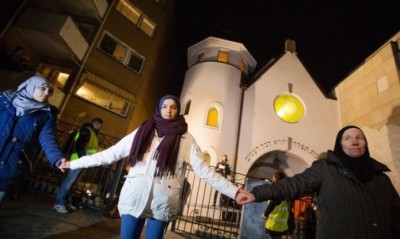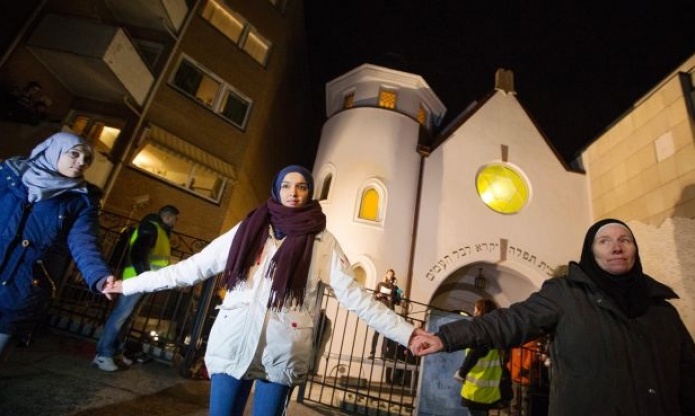
We Jews have a problem: we fetishize Muslims.
Not just any Muslims, though: we choose to fetishize the “Good Muslims.” The Muslims, or the Arabs, who stand up for our cause, who toe our party lines, and who stand up to protect us. To be sure, many in our Jewish community also often quite hastily typecast all Muslims, all Arabs, all Palestinians — often forgetting that not all Palestinians are Muslim, not all Muslims are Arab, and not all Arabs are Muslim —as inherently against us, the Westerners, or us, the Jews.
But we also have the exact opposite problem: we elevate those who seek to support us, and give them a pedestal and a platform to speak on. And, in so doing, we at the very best implicitly, and sometimes even explicitly, villainize other Arabs, Muslims, and Palestinians. We prop the “Good Muslims” up not because they are good, but because we see them as better — better than their peers, better than the others in a group of millions, or even billions, of people. And, in so doing, erase the many others who are just as good but don’t measure up to our standards of goodness.
Not every Muslim is a radical, anti-Semitic murderer, and not every Muslim needs to form solidarity rings around synagogues in order to prove to us that #notallMuslims needs to be a trend. We can, and should, applaud those who stand up against anti-Semitism not because they are Muslim, but because they are standing up against anti-Semitism. And we do this again and again, as if we need to prove to ourselves that, no, not all Muslims, not all Arabs, and not all Palestinians are “against us,” whatever we stand for and whomever “We” are: we do this with Muslims who form solidarity rings, but also young Palestinian boys who spoke out against the kidnapping and subsequent murder of three Israeli teenagers, whose video containing a harsh indictment of the kidnappings circulated widely in Jewish circles.
And I would like to suggest that we do not need to be proven to. Instead we, as Jews, need to change our assumptions about those around us.
Because at a basic level, when we applaud Muslims specifically for being Muslims who stand up against anti-Semitism, we forget that, in fact, not all Muslims are radical supporters of ISIS. Our Muslim friends should not have to prove that they are different from terrorist groups in the same way that we, as Jews, should not have to prove that we are different from the Baruch Goldsteins — especially given that Purim is in less than two days — and the Lev Tahors and so many of the other groups and individuals with whom most mainstream groups disagree.
At an even more basic level, the issue is not that we shouldn’t be grateful for when our Muslim, or Arab, or Palestinian peers do stand up for us against extremism, it’s that we expect them to do this in the same way that we, in turn, are often expected to explain to our peers that, no, not all Jews support Israel the same way (if at all) and that, no, not all Jews practice the same way or believe that women should be subjugated, oppressed, and silenced — all of which are statements that I have had to personally refute.
So when we create this image within our Jewish blogosphere of the “Good Muslim” who stands up against anti-Semitism, we not only create the inadvertent (at best, or explicit, at worst) image of the “Bad Muslim” in the same way that such negative portraits are painted of us when we, in turn, are expected to counteract as well. And these portraits are just as unfair of them as they are of us: in an ideal world, we should all be able to know that not all Muslims are radical terrorists Creating the false dichotomy of the “Good Muslim” and the “Bad Muslim” plays on our ignorance of another religion, another nation, another people entirely.
When we fetishize Muslims in this way, we create expectations to which other groups might not hold themselves and dictate to them how they should handle much of their internal affairs. And we do this at the expense of the idea that to say that we expect Muslims to stand up against anti-Semitism is inherently problematic in the sense that there is no one person who can speak for all Jews (yes, Prime Minister Netanyahu, I’m looking at you right now), we cannot expect there to be one person who speaks for some 1.5 billion Muslims, or some 11.6 million Palestinians, or some 365 million Arabs. Just because ISIS and other terrorists who are Muslim are evil use Islam as their backing — and there is no doubt that they are evil — does not mean that the entirety of the Islamic world should be decried as evil, as well.
Amram Altzman is a student at List College.

